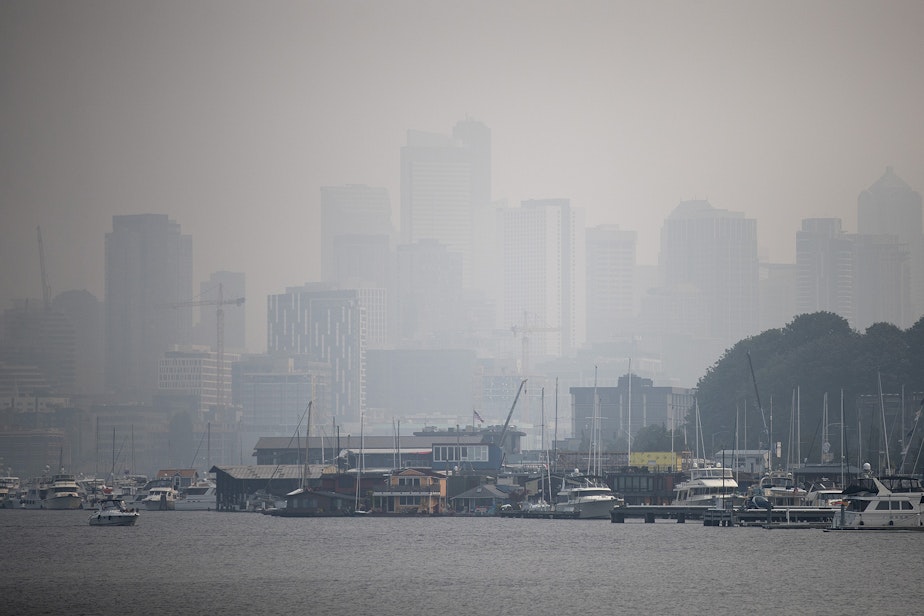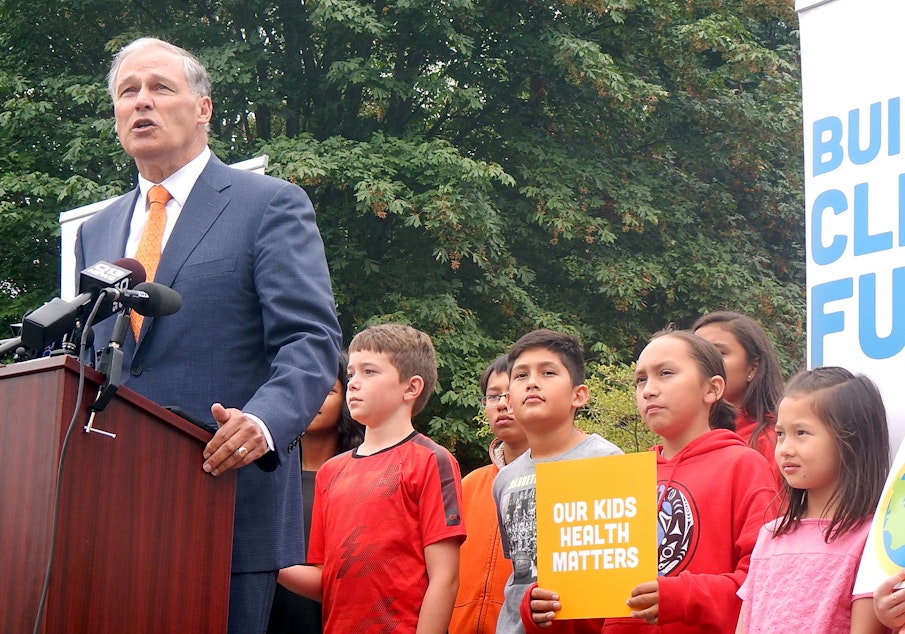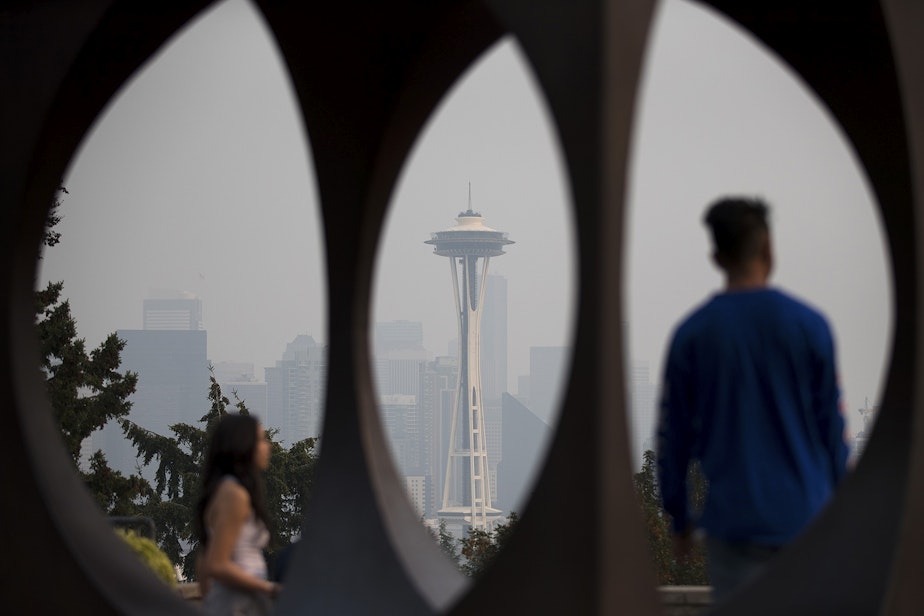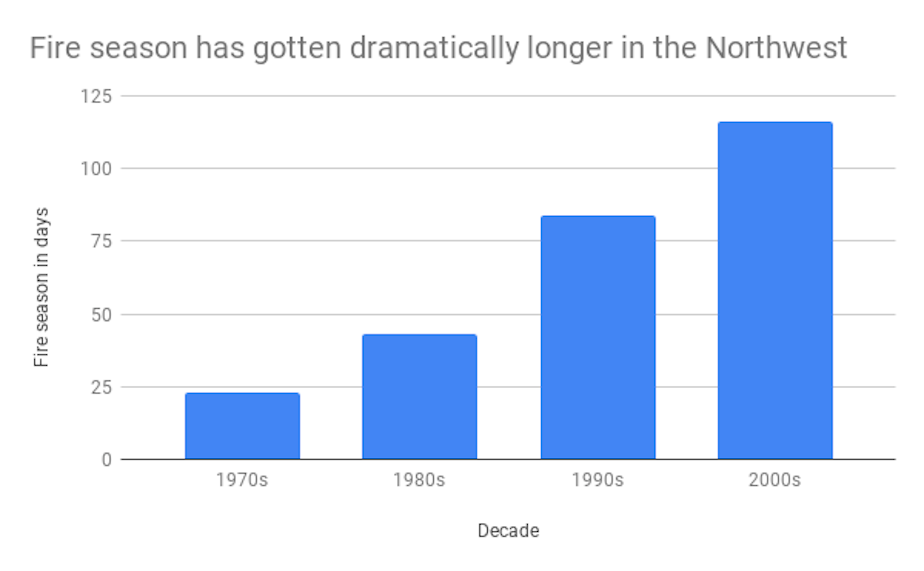Will smoky Northwest skies yield America's first carbon tax?

Environmentalists hope Washington voters will feel the urgency of climate change.
Outside an elementary school in Seattle, Gov. Jay Inslee promoted the latest attempt to kick the state’s carbon habit.
“These children will suffer unless we do something about climate change, and that is a scientific certainty,” he said.
Campaign staffers had lined up a dozen photogenic children behind the podium just before Inslee spoke.
“Fortunately we have a chance to act, and that's the clean air initiative 1631. It will give us what these kids deserve, which is less forest fires,” he said as smoke from fires around the West blanketed much of his state.
The initiative would slap a fee — or tax, depending on your preferred lingo — on coal, oil and natural gas, based on how much carbon those fuels release when they're burned. It works out to 13 cents on a gallon of gas.
Big oil companies aim to convince voters the measure on the November ballot is a flawed approach to climate change.
BP, Phillips 66 and Andeavour (formerly Tesoro) have pumped $8.7 million into the campaign against the initiative so far — more than twice what environmentalists have raised to support what would essentially be the nation’s first carbon tax.
Backers insist it’s a carbon “fee,” not a tax, since the money wouldn’t go to the government’s general coffers.
It would go to specific programs, like clean energy, forest restoration and programs to help poor people save on their energy bills.
Meanwhile, the federal government has been running the other direction, trying to undo climate policies at the state, federal and global levels.

The same day Inslee talked about forest fires at a school playground, Interior Secretary Ryan Zinke, who oversees public lands across the country, did so on Fox Business News.
“Do you believe climate change is real and that man is the cause?” interviewer Neil Cavuto asked.
“There’s no dispute that climate is changing, although it has always changed,” Zinke said. “Whether man is the direct result [sic], how much that result is, that’s still being disputed.”
For the record, climate scientists do not dispute that humans are responsible for rapidly changing the climate.
At the school playground, Inslee mocked Zinke for getting basic science so wrong.
“Interior Secretary Zinke would flunk any single science test these kids get A's on,” Inslee said, drawing laughs from the crowd. “He would have a dunce cap put on his head if he was in Lawton Elementary School because the science we are teaching our children is abundantly clear.”
Inslee has even called for Zinke’s resignation.
"That man would sell his grandchildren for the oil companies, and he's doing that,” Inslee said.
Interior press secretary Heather Swift said that Inslee’s statement did not merit a response from the Secretary of the Interior.
“This little stunt is not at all based in fact, outrageously pathetic, and sad,” she said in an email to KUOW.
Big Oil, big bucks
As for the oil companies Inslee mentioned, they have waded into Washington politics in a big way: No other campaign in the state has raised as much money as the No on 1631 campaign, according to the Washington Public Disclosure Commission. (A Big Soda-funded effort comes close: Pepsi, Coca-Cola, Dr. Pepper and Red Bull have poured $8 million into a campaign to prevent any Washington cities from passing a soda tax as Seattle did last year.)
Almost all (99.9 percent) of the $8.7 million dollars raised to block the carbon measure has come from the oil industry.
No on 1631 spokesperson Dana Bieber oil-funded campaign said she agrees that climate change is a serious problem.
But she said Initiative 1631 takes an ineffective and costly approach.
“The largest polluters in the state are exempt from paying the fee,” Bieber said.
The carbon fee wouldn’t apply to pulp mills, ships, airplanes, aluminum smelters, Boeing or the state’s one remaining coal-fired power plant. While the Transalta coal plant in Centralia is being partially shut down in 2020 and completely shuttered in 2025, it’s still the biggest single source of carbon emissions in Washington.
“There's all these exemptions in there,” Bieber said. “That's an unfair policy that makes it ineffective.”
Despite repeated questioning, Bieber declined to say how Washington should fight climate change, if not with this initiative.
The yes campaign says its proposed $15 per metric ton fee would apply to 80 percent of the state’s carbon emissions. It would include motor vehicles, which are collectively the state’s biggest source of heat-trapping pollution by far. Cars and trucks, of course, burn fuel made by the oil companies that are funding the fight against the carbon fee.
The yes campaign has raised $3.8 million, with The Nature Conservancy its biggest donor at $775,000. Retired software executive Craig McKibben and his wife, retired teacher Sarah Merner of Seattle, have each given $500,000.

The yes campaigners have pitched their ballot measure as a way to give today’s kids smoke-free air to breathe. That’s a stretch, even though there is a clear link between climate and fire.
Warmer winters and shrinking snowpack have let Northwest forests dry out, and become prone to burning, earlier in the year. The Northwest’s fire season used to be a few weeks in August; now it runs nearly four months.
“We're getting a glimpse as to what the future holds,” University of Washington climate scientist Heidi Roop said. “As it gets warmer and drier, we're more ripe for bigger wildfires.”

With all the carbon pollution already in the sky, the world’s climate and fires are expected to get at least somewhat worse for several decades.
Climate scientists at the University of Washington say, if global carbon emissions continue at even a moderate pace, our warming climate could triple the acreage of fires in the state in the next 25 years.
There’s no plausible scenario in which the world eliminates carbon emissions fast enough to lower the earth’s temperature while the kids used as press-conference props are still kids.
But scientists agree that an aggressive transition away from polluting fuels would eventually keep temperatures, forest fires, sea level rise, ocean acidification and other impacts of carbon pollution from getting much worse than they are now.
KUOW environment reporter John Ryan loves getting tips and documents. He can be reached at jryan@kuow.org or on the encrypted Signal or WhatsApp apps at 1-401-405-1206 (whistleblowers, never do so from a work or government device, account or location). For greatest security, use KUOW's SecureDrop portal. Snail mail is also a safe way to reach him confidentially: KUOW, 4518 University Way NE #310, Seattle, WA 98105. Don't put your return address on the outside.




